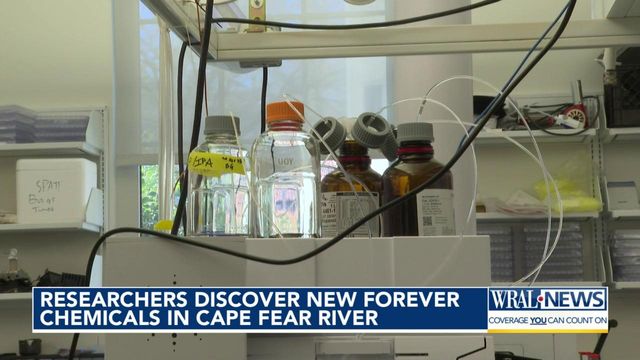New forever chemicals discovered in Cape Fear River
After years of legal action surrounding forever chemical contamination in drinking water from Fayetteville to Wilmington, researchers at the University of North Carolina at Chapel Hill have discovered additional types of PFAS in the Cape Fear River.
Erin Baker and her research team used advanced analytical techniques to detect 11 PFAS compounds, eight of which were unknown to the Environmental Protection Agency.
"Sometimes industries make chemicals and don’t have to report them," Baker said.
The source of the newly-discovered chemicals is unclear, but the majority of the samples were taken near the Chemours Fayetteville Works plant, where other PFAS chemicals found in the river were manufactured.
Chemours did not answer questions about whether the PFAS identified by UNC researchers had been made or manufactured at their facility, but a spokesperson highlighted emission mitigation measures adopted at the facility after the samples analyzed in the study were collected. In recent years, Chemours installed a thermal oxidizer and underground barrier wall to comply with a 2019 consent order that required the company to limit its pollution.
Chemours has been plagued with litigation since researchers in 2017 determined the chemical company had been dumping PFAS into the Cape Fear River, a drinking water supply.
For residents in impacted communities, including former Wilmington Mayor Harper Peterson, it's troubling to see researchers finding more chemicals in the water.
"Thank goodness for the research that our educational institutions have done," Peterson said. "Without them, we would know what we know today and that's alarming."
Peterson, who's lived in Wilmington for more than five decades, says he is concerned that his wife and other members of the community are facing health issues because of the contamination.
"This human tragedy is everywhere," Peterson said.
The findings have renewed a push for more regulation and disclosure requirements for PFAS manufacturers from advocates, including Emily Donovan with Clean Cape Fear.
"I don't think the burden needs to fall on the academic community to figure out what is in the environment, the burden really should fall on the manufacturer," Donovan said. "If they're making money off of this chemistry, then they should know exactly what they're making, what they're unintentionally releasing, and what they are intentionally releasing."
Baker says identifying what chemicals are in the water is a key step toward analyzing the human health impacts.
"It's really important to know what chemicals you've been exposed to, especially if we see changes in the health of different communities," Baker said.












